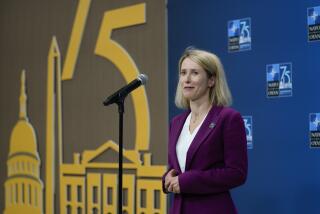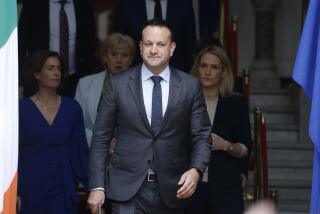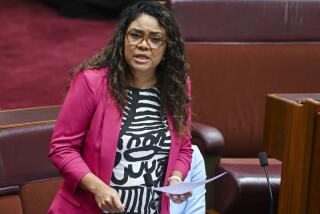Australia gets 1st female prime minister after party revolt
Reporting from Seoul and Sydney, Australia — Australia has its first female prime minister after the ruling Labor Party revolted against beleaguered Premier Kevin Rudd to install his deputy as leader of the nation of 21 million.
Seeking to avoid an election defeat later this year, the party rallied Thursday behind Julia Gillard, who analysts predict will bring only a change of leadership style — and not substance.
The Welsh-born Gillard, 48, daughter of a coal miner, is not expected to make any major policy reversals, such as Australia’s commitment of troops to the war in Afghanistan.
Gillard will be sworn in by Gov. Gen. Quentin Bryce, the first woman to hold that office, solidly breaking tradition in a nation known for its jocular, male-dominated culture.
“Australian politics has been quite conservative, and it comes as a big shock for a woman to be elected prime minister,” said Andrew Hughes, a political analyst at Canberra-based Australian National University. “Since our time of federation in 1901, over 109 years, we’ve had 26 prime ministers, and not one has been female.
“It’s taken a long time, but we’ve gotten there.”
In an emotional final public address as prime minister, Rudd said he was proud of his government’s achievements.
“I have given my absolute best … I’ve given it my all,” he said. “We have made Australia a fairer and better place than it would have otherwise been. What I am less proud of is the fact that I have now blubbered.”
The 52-year-old Rudd has had a stunning swoon in popularity in recent months. He was elected prime minister in a landslide election in 2007, rising to power on a Barack Obama-like platform of social and political change, bringing his party to power after 11 frustrating years in opposition.
“He came in making a lot of promises on the nation’s health and economics, and delivered on few of them,” Hughes said. “In recent months, his message became confused to most voters. They no longer knew what he stood for.”
Among Rudd’s first major acts as prime minister was to apologize to Aborigines who are known as the “stolen generation” because they were forcibly removed from their families in the last century. On a day of national mourning and celebration, many predicted the dawn of a new Australia.
But this spring, his administration seemed to come apart when he faced unsubstantiated corruption claims. Among other unpopular policy reversals, he dumped a much-vaunted carbon tax that he had introduced by describing climate change as “the biggest moral challenge of our times.”
In the end, Rudd’s fall from grace came swiftly. In February 2008, he ranked as the most popular prime minister in the nation’s history, with an approval rating of 70%. In recent months, his numbers plummeted to below 50% and he became only the second prime minister to be ousted by his party.
On Thursday, Gillard stood unopposed at a vote of her party’s 112 lawmakers, hours after Rudd was dumped.
“I feel very honored,” she later told reporters.
Asked about being the nation’s first female prime minister, she responded: “Well, first woman, maybe the first redhead.... I’ll allow you to consider which is more unlikely.”
Gillard has recently shown flair as a warm, friendly leader. She is not married but remains in a long-term partnership with hairdresser Tim Mathieson.
She migrated to Australia from Wales at age 4 with her family, which was in search of a warmer climate because she had a lung ailment.
In addition to Cabinet posts, she has also served as deputy prime minister.
She faces fearsome competition in national elections expected to take place later this year. One poll this month showed Labor trailing the opposition for the first time in more than four years.
On Thursday, within hours of Gillard’s rise to power, the Internet was buzzing with reaction from across Australia, not all of it positive.
“Now we have an unwed, childless, atheist PM. I’ve never felt so represented,” one writer said.
Glionna reported from Seoul and special correspondent Bennett reported from Sydney.
Researcher Ju-min Park of The Times’ Seoul Bureau contributed to this report.
More to Read
Sign up for Essential California
The most important California stories and recommendations in your inbox every morning.
You may occasionally receive promotional content from the Los Angeles Times.











